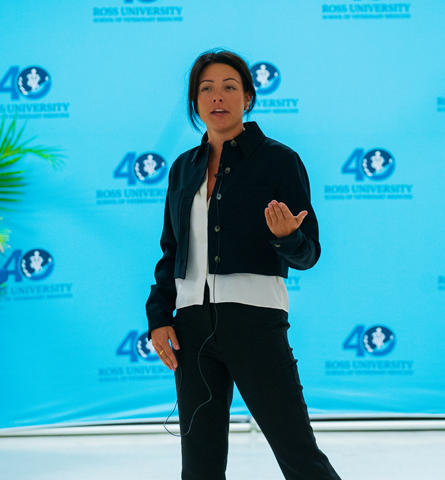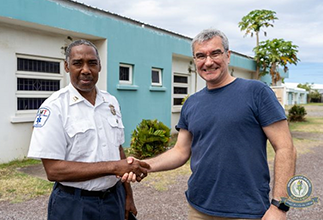On the path toward becoming a veterinarian, Cynthia “Cindy” Xue, DVM, assistant professor of equine internal medicine, remained consistent in one thing – that her career would be in service to the community. She would volunteer at shelters whenever the opportunity arose, planned externships that had very engaged community outreach programs, and spent a portion of her time in veterinary school participating in a research grant at the American Fondouk, a charitable equine hospital in Morocco. It was here ‘Dr. X,’ as she is known affectionately by her students and peers, found her true calling.
“I discovered most of the animals that walked through the doors were donkeys because donkeys were more affordable than horses. And these animals, although they had critical jobs in the community, were often misunderstood,” said Dr. Xue. “I really wanted to be, in a sense, a pioneer for this species and be able to practice evidence-based medicine so we would no longer need to extrapolate information from horses to treat donkeys because, physiologically, they’re different.”
Dr. Xue’s path to veterinary medicine started in the New York City boroughs of Queens and the Bronx. The big city life did not expose Dr. X to many agricultural species in their natural habitat, but her passion for animals still found her admiring the city’s squirrels and pigeons all the same. She recalls a love for going to the zoo with her parents and seeking out as many nature education programs as she could at a young age. This early foundation led her to Rutgers University, where her initial sight was set on becoming a marine biologist. When she found that that career was not as much focused on clinical work, Dr. X pivoted to pursue her Doctor of Veterinary Medicine (DVM) degree at Cornell University.
After earning her DVM from Cornell in 2016, Dr. Xue brought donkeys and equine medicine into focus through a rotating equine internship at Cornell Ruffian Equine Specialists, followed by a residency in Large Animal Internal Medicine at the University of Georgia, where she met a friend that graduated from Ross University School of Veterinary Medicine (Ross Vet).
“She would tell me, ‘I know you love donkeys. Ross Vet has a ton of donkeys. And you’re a good teacher,’” recalled Dr. Xue. “I did the entire interview not expecting anything, but it kept manifesting. I loved the culture, the diversity—and obviously my donkeys. I never intended to be in academia, but I also never thought of teaching my students as teaching per se; instead, I thought of teaching as helping my future colleagues understand how to become the best veterinarian they could be.”
Now having been with Ross Vet for over a year and a half, Dr. Xue has become a mentor for so many Rossies interested in donkeys and equine medicine. She founded Ross Vet’s Donkey Club, which has grown to over 140 members. Being able to offer hands-on experience through the Donkey Club creates valuable opportunities for students to learn more about the evolutionary biology that shapes donkey behavior before encountering their first donkey in upper semester surgery labs and provides extra practice on essential skills.
Dr. Xue’s mentorship of Rossies extends beyond her expertise in donkeys; she has become a mentor to many Asian, Asian American, and Pacific Islander (AAPI) students that are on a similar path as hers. “Representation in and of itself is such a powerful thing because I’ve had students come up to me letting me know they never thought they would be interested in large animals. They never thought that they would see a large animal veterinarian that looked like them—and now they are inspired to become one,” said Dr. Xue. “Ironically, I felt the same thing! Being here, though, I feel like I can make a difference. Ultimately, it circles back to wanting my career to be something that doesn’t just impact myself but impacts others as well, and uplifts the entire community that I work in.”
Asians only make up 5.6% of the veterinary workforce, according to data from the United States Bureau of Labor Statistics (source). “It’s important to remember that the demographics of veterinary clientele are very diverse. But if that isn’t reflected in the community of veterinarians treating those patients? Then you’re already starting at a disadvantage in terms of being able to provide quality veterinary care that is tailored to nuanced needs.”
As she continues her dedication to mentoring students and encouraging more AAPI representation in veterinary medicine, she believes that it’s important to build understanding with students by providing a safe space for them to discuss what they’re going through as a minority in the field.
“The more we talk about issues in diversity, the less it becomes a ’scary’ topic, the less it becomes so uncomfortable we don’t even want to approach it, and the more that we can move beyond that discomfort to go forth with systemic change.”







